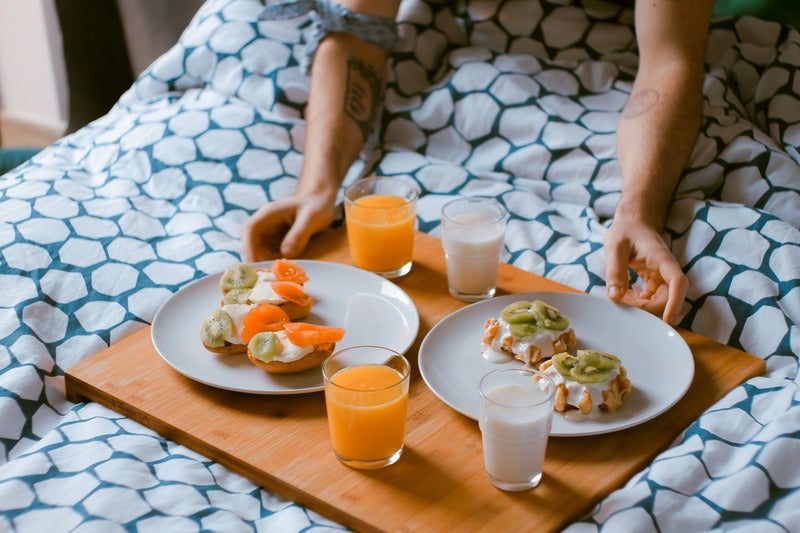How Your Diet Affects Your Sleep (And Vice Versa)
Bad pillows, background noise, pain, hunger, stress; all of these are factors that can stop you from getting a good night’s rest. There’s plenty of advice out there on how to handle these, but another impactful facet of our lives that affects our rest is what we eat. While some people overlook it, diet can play a major role in how well or how poorly you sleep. Moreover, your sleep patterns can have major effects on your appetite. How does it work? Read on to learn more.
The Impact of Diet on Sleep:
- Low fiber diets can reduce the quality of your sleep
- Common ingredients can keep you awake longer
- Lack of sleep can cause you to eat more
Nutrients can impact your sleep
Consuming a diet that is low in fiber and high in saturated fats and natural sugar can impact the quality of your sleep, according to the National Sleep Foundation. A fiber deficiency and any associated upticks in fat or carbohydrates have the tragic effect of reducing the amount of short-wave sleep you get when resting, leaving you exhausted when you wake up in the morning; even if you got your 8 hours.
Consumption of high-fat foods can also induce heartburn, leaving you uncomfortable and unable to ignore its effects well enough to drift off. On the other hand, though, consumption of foods high in B vitamins, including fish, white meat, and eggs, can assist in the production of melatonin, the primary sleep hormone. High-fiber foods like whole grains also increase short-wave sleep time, helping you to feel rested in the morning.
Common substances can keep you awake
It’s a no-brainer that drinking coffee before bedtime will sabotage your efforts to have sweet dreams, but as WebMD notes, caffeine has a tendency to hide everywhere. Beverages from soda to tea can contain caffeine. It’s even present in foods like chocolate, so it’s important to check the nutrition facts of what you’re eating to make sure you won’t keep yourself awake.
Nicotine is also a powerful stimulant, though easier to avoid. Vaping, smoking or chewing tobacco elevates heart rate, blood pressure, and suppresses the urge to sleep, leaving you wide-eyed on your bed. Alcohol is also more than capable of sneaking up on you.
Consuming enough alcohol before bed to feel its effects may lend itself to falling asleep at first, but it is metabolized in your body within 3 hours as a form of sugar and can then lead to you waking up with a hangover in the middle of the night or morning.
The time you eat can impact sleep, too
Our busy lives often mean that we’re left with so little time to eat throughout the day. This can change from day to day, too; a busy day at work might mean you need to continue grinding through your lunch and pick up a snack later, or sports practice might interfere with dinnertime.
Unfortunately, NBC reports that inconsistent timing of our meals impacts our circadian rhythm, our body’s “internal clock”. Constantly upsetting this clock means our body is unsure of when it’s really bedtime, which can lead to feeling sluggish at midday but wide awake at 1 in the morning. Having consistent meal times can work wonders for your beauty sleep.
On the flipside, though, your sleep can also have a substantial impact on your body’s metabolism and the success of your diet. Changes in your body’s chemical process, as well as your own mood, can have adverse effects and may sabotage your efforts to lose weight or feel healthy. This does beg the question: Can you sleep to lose weight?
Lack of sleep alters glucose metabolism
Tossing and turning at night is more than just frustrating; it ends up disrupting your body’s ability to perform its normal chemical processes. Research from the Journal of Sleep Medicine Review found that chronic sleep curtailment (defined as persistently getting under 7 hours of sleep per night) reduces the effective rate of glucose digestion, leading to its storage as fat cells within the body.
Even if you make your best efforts to count calories, eat well, and exercise, a lack of sleep will mean that the glucose you do eat will get turned into fat cells anyway.
Lack of sleep reduces insulin sensitivity
Insulin is the hormone responsible for signaling the liver to take in blood glucose, regulating your blood sugar. If you aren’t sleeping well it can lead to a reduction in your liver’s responsiveness to the hormone, according to findings in the International Journal of Endocrinology.
If your liver isn’t listening to the insulin it’s receiving, that can result in the development of type 2 diabetes. In the short term, it means an increase in your blood sugar levels and feelings of hunger; which leads to the next point...
Lack of sleep can cause you to make poor food choices
If you wake up exhausted, hungry, and irritable, it’s not likely you’ll take the time to prepare a balanced meal, saliently put by WebMD. On top of that, insulin resistance also means your liver thinks you need more sugar, making you more likely to grab a sugary coffee, doughnut, or some other high-fat, high-carb comfort food to help you feel a little bit better.
Sleeping better can help your diet
There’s a preponderance of evidence showing how sleep deprivation can impact you in some nasty ways, so the solution is clear: Healthy sleep will help you with a healthy diet, and a healthy diet will help you with healthy sleep.
An excellent kickstart to this positively-reinforcing cycle is to get an excellent night’s rest with a luxurious, comfortable pillow, like the Luxe Pillow. Upper body support, cozy materials, and cool, regulated temperatures make this pillow an absolute dream to sleep on. Who knew the path towards a healthy body and mind could be started with a comfy pillow?

